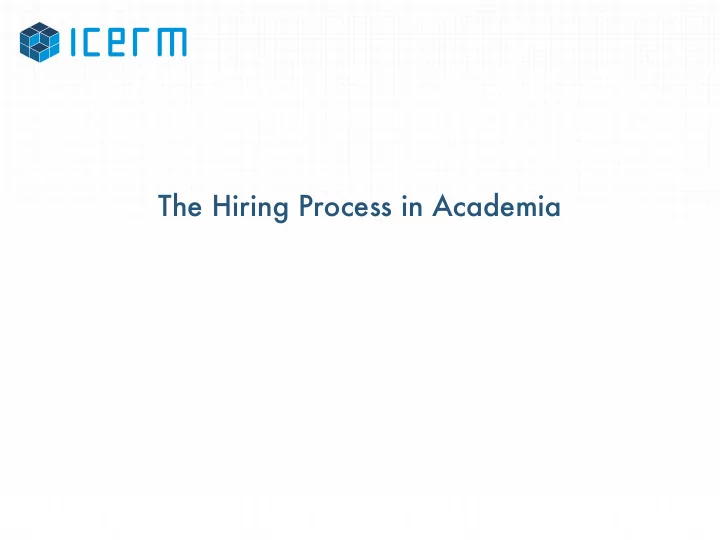

The Hiring Process in Academia
Hiring process • Differs between departments: • committees make shortlists • faculty often votes to rank-order shortlists • administration approves, and • interview requests or offers are then made • Preliminary interviews: • Joint Mathematics Meetings • Phone or Skype interviews • Campus interviews: • Formal interview lecture: (details on next slide) • Typically a research talk (but targeted at a general mathematics audience) • Some departments (in particular, liberal arts colleges) ask that you give a calculus/ linear algebra lecture for undergraduate students • Formal meetings with Chair and Dean • Informal meetings and lunches/dinners with faculty
Interviews … • Be professional • Be yourself • Interview lecture: • Give a broad, accessible introduction, motivate why you are interested in the problem, put your research into context • Spend 20-30 min on your own contributions (can be technical but make clear how this relates to the motivation you outlined before) • Outline of other problems you work on, future research, … do not go over time! • Questions you may be asked: • Why did you apply? How do you see yourself fitting into the department? How would you strengthen the department? What courses do you want to teach? • Question you may want to ask: • Living environment: benefits (health insurance, retirement), housing (schools, day-care) • Junior sabbaticals, parental leave (and the tenure clock!) • Teaching: teaching load, which courses would I teach? • Research: quality of facilities, financial support for seminar speakers • Service: expectations for service and committee work • Expectations: what are the expectations for tenure? how many junior faculty got tenure over the past years? how is teaching and research evaluated? • Support: seminars, graduate students, postdoc positions, visitors, ...
Negotiations ... • Negotiations often start before a formal offer is made – prepare for this case • In principle, everything can be negotiated, though what you may obtain in the end depends on your leverage (other offers) and on the position (postdoc offers are much more rigid) • Prepare a wish list: • salary, startup funds (ideally not time-limited), teaching reduction, service load, office space, computer equipment, moving expenses • Prioritize your list and prepare arguments/justification for what you ask for (eg “I plan to apply for grants XYZ in my first year, so a teaching reduction would be helpful”) and emphasize benefits for department (if there are any) • Startup often comes from the Dean’s office: give the Department Chair arguments that they can work with • Be polite but also state your requests clearly: have your mentor read over your emails if you are unsure about how to formulate requests or inquiries.
Applying for jobs in industry CareerLab at Brown Chapter 5: Outside Academia – Finding a Job in Industry, Business, or Nonprofits http://brown.edu/campus-life/support/careerlab/graduate-students/doctoral-students/doctoral-students Preparing for the nonacademic job market • Apply for internships in companies or national labs • Make use of Brown’s career fair and BRUnet Job opportunities • https://shibboleth-brown-csm.symplicity.com/sso/ – Brown Job Board • http://jobs.nagps.org/a/jobs/find-jobs – Natl Assoc. of Graduate Students • http://jobs.phds.org/ • http://www.monster.com • https://www.siam.org/careers/internships.php
Applying for jobs in industry Application materials • Cover letter (1 page): • tailor the cover letter to the job you apply for: showcase the skills and personal characteristics that the employer looks for (mention your communication, teamwork, research, analysis, and other skills that are desirable in the non-academic setting) • Resume (1-2 pages): • highlights your skills and experiences to show that you are a good fit for the targeted position • the purpose of your resume is to secure an interview: it needs to convince the reader that you are the person they are looking for • when changing your CV to a resume: what will help you make your case to a prospective employer and what will merely distract him or her? CareerLab • Beverly Ehrich offers group and individual information sessions
Recommend
More recommend